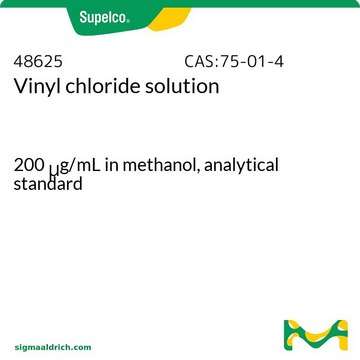31564
Acrylonitrile
analytical standard
Synonym(s):
Vinyl cyanide
About This Item
Recommended Products
grade
analytical standard
Quality Level
vapor density
1.83 (vs air)
vapor pressure
86 mmHg ( 20 °C)
Assay
≥98% (GC)
autoignition temp.
897 °F
quality
stabilized
shelf life
limited shelf life, expiry date on the label
expl. lim.
17 %
technique(s)
HPLC: suitable
gas chromatography (GC): suitable
refractive index
n20/D 1.391 (lit.)
bp
77 °C (lit.)
mp
−83 °C (lit.)
application(s)
cleaning products
cosmetics
environmental
food and beverages
personal care
format
neat
storage temp.
2-8°C
SMILES string
C=CC#N
InChI
1S/C3H3N/c1-2-3-4/h2H,1H2
InChI key
NLHHRLWOUZZQLW-UHFFFAOYSA-N
Looking for similar products? Visit Product Comparison Guide
General description
Application
Biochem/physiol Actions
Signal Word
Danger
Hazard Statements
Precautionary Statements
Hazard Classifications
Acute Tox. 3 Dermal - Acute Tox. 3 Inhalation - Acute Tox. 3 Oral - Aquatic Chronic 2 - Carc. 1B - Eye Dam. 1 - Flam. Liq. 2 - Skin Irrit. 2 - Skin Sens. 1B - STOT SE 3
Target Organs
Respiratory system
Storage Class Code
3 - Flammable liquids
WGK
WGK 3
Flash Point(F)
23.0 °F - closed cup
Flash Point(C)
-5 °C - closed cup
Personal Protective Equipment
Choose from one of the most recent versions:
Already Own This Product?
Find documentation for the products that you have recently purchased in the Document Library.
Customers Also Viewed
Our team of scientists has experience in all areas of research including Life Science, Material Science, Chemical Synthesis, Chromatography, Analytical and many others.
Contact Technical Service














